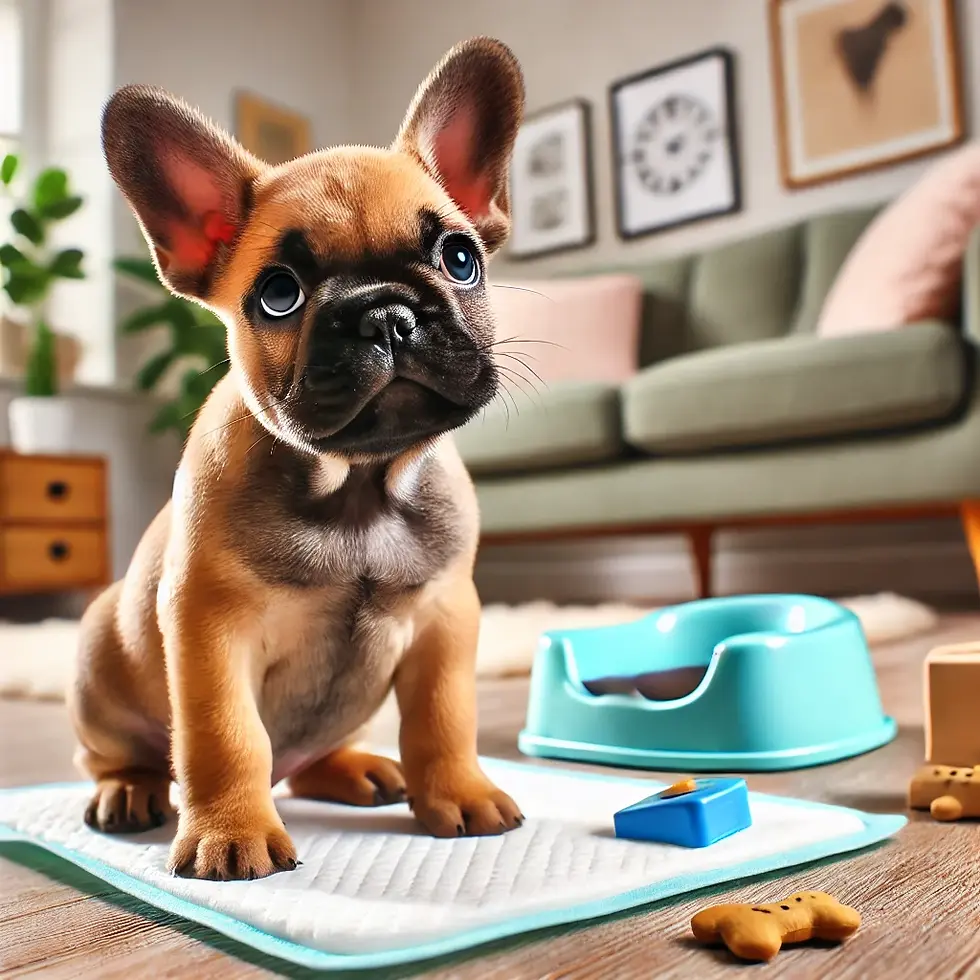Are Frenchies Hard to Potty Train? A Comprehensive Guide
- argenis09
- Jul 19, 2024
- 3 min read
Updated: Jul 21, 2024
Ah, the joys of welcoming a French Bulldog into your home! With their trademark bat ears and irresistible charm, Frenchies quickly become beloved family members. But, as with any puppy, there's the inevitable (and sometimes daunting) task of potty training. Are French Bulldogs particularly challenging to potty train? Let's explore this topic to set you and your Frenchie up for success!
Understanding the Nature of French Bulldogs
French Bulldogs are known for their stubborn yet loving nature. This playful demeanor, coupled with their intelligence, can sometimes make potty training a slightly challenging endeavor. However, with patience and consistency, you can effectively potty train your Frenchie. Their innate desire to please their owners can be an asset in this training process.
Steps to Effective Potty Training
Establish a Routine: Dogs thrive on routine. Take your Frenchie out at the same times every day, such as first thing in the morning, after meals, and before bedtime. Consistency helps them understand when and where they should go.
Positive Reinforcement: Reward your Frenchie with treats and praise every time they successfully go potty outside. Positive reinforcement strengthens good behavior and helps them associate outside pottying with positive outcomes.
Supervise and Confine: When you’re home, keep a close eye on your puppy. If you can’t supervise them, consider using a crate or a confinement area to prevent accidents. Most dogs instinctively avoid soiling their sleeping area.
Recognize the Signs: Learn to recognize when your Frenchie needs to go out. Signs can include circling, sniffing around, or whining. Quickly taking them outside can prevent accidents and reinforce good habits.
Features & Benefits
Enhanced Bonding: Potty training offers opportunities to bond with your Frenchie through attentive care and positive interactions.
Peaceful Home Environment: A well-potty-trained Frenchie means fewer accidents, leading to a cleaner, more stress-free living space.
Knowledge and Preparation: Armed with effective potty training strategies, you'll feel more confident and prepared to address challenges.
Scenarios
New Puppy Owners: If you're bringing home a French Bulldog puppy, these steps are essential for establishing good habits early.
Adopting Adult Frenchies: Even adult dogs may need potty training refreshers to adapt to their new environment.
Busy Households: Consistent routines and positive reinforcement help manage potty training in active homes with multiple family members.
Pros and Cons of Potty Training French Bulldogs
Pros:
Strengthens your bond with your Frenchie
Leads to a cleaner and more enjoyable home environment
Helps establish discipline and routine
Cons:
May require more patience due to their stubborn nature
Accidents can still happen, especially in the early stages
Might need longer periods of supervision initially
FAQs
Q: How long does it typically take to potty train a French Bulldog? A: Potty training can take anywhere from a few weeks to several months. Consistency and patience are key. Every dog is different, so times can vary.
Q: Can adult Frenchies be potty trained? A: Absolutely! While puppies are generally easier to train, adult Frenchies can be potty trained with consistent routines and positive reinforcement.
Q: What if my Frenchie has accidents inside? A: Don’t punish your dog. Clean up the mess thoroughly to remove the scent and continue with your training routine. Punishment can often confuse and scare them, making training harder.
Q: Should I use puppy pads during potty training? A: Puppy pads can be helpful, especially for young puppies or during times when taking them outside isn’t feasible. However, it’s important to transition to outdoor training to prevent future indoor accidents.









































Comments